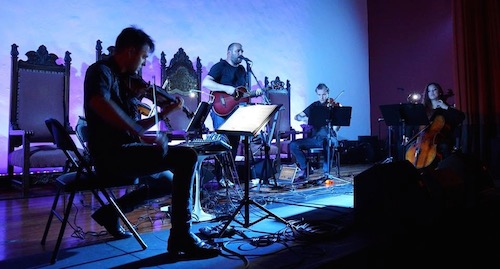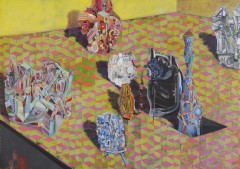Music Andrew Joslyn — October 20, 2014 12:22 — 0 Comments
On The Road With Dave Bazan and PSQ – Andrew Joslyn
I woke up this morning in Fort Stockton, Texas. The Super 8 Motel room’s air was cool, and smelled faintly of dried vomit (by-product of a previous tenant). Our cockroach companion still lay cooling himself in the porcelain tub, where we left him last night. I couldn’t stop thinking about him for an hour as I was falling asleep last night – between dreaming that my bedsheets were infested with a swarm of cockroaches, or that I was transforming into a 5 foot bug myself (in Kafka ‘Metamorphosis’ style), I had a hard time letting myself drift off. Despite all these seemingly grotesque conditions, I fell asleep and woke up this morning, distinctly happy and satisfied.Â
Currently I’m on tour with my group, the Passenger String Quartet, which is performing alongside David Bazan (founder of Pedro the Lion, Headphones, etc.) in support of our newest album release, “David Bazan and the Passenger String Quartet: Vol. 1.†We’ve been on the road for roughly one week so far – we started off rolling down the west coast: Sacramento, San Francisco, Los Angeles, San Diego, and then Phoenix. We are heading to Austin now, rolling through the flat and hot Texan countryside. We’ve already travelled over 2,200 miles so far, and we have another 5 1/2 weeks to go on the road. I’ve been using the extra free time in the van to write additional compositions for new music that Bazan has been putting out, with his Bazan Monthly’s – which it helps keep me sane, and feeling productive during the downtime.
It’s hard to imagine that this is now my full-time job – being a musician, that is – well being a musician, working with my musical idols, and sharing my own art/writing with the world. It’s a struggle like any other job, with it’s ups and downs. Unfortunately the downs are always about money. Just worrying about sustaining a dream. Thankfully, with a tour like this one, it’s utterly amazing and hard to have a bad time. Bazan is a touring veteran and workhorse – his own touring schedule takes him the circumference of the United States at least four times a year. So he runs a tight ship, which is professional, but laid back and also fun. Our touring sound engineer is Chris Colbert, who toured with the Walkmen, Sufjan Stevens, and others, for years, so the musical history and experience that we are surrounded by is deep and rich.
While in the van, I read earlier this week a post on Facebook from one of my fellow musicians in Seattle. They candidly opened up about their struggles with the state of the industry, the impact it had on their own music making, and that they were considering not putting out any more music. This was a little bit of a shock – since I occasionally get these pangs of doubt, and wonder if a day job would provide the comfort, and consistency that sometimes I wish a career in music could provide. It is possible for sure – it’s just hard, and takes grit. I felt for my friend, and I could genuinely relate. It isn’t easy to make a living off art. Check out Elizabeth Renzetti’s article about Iggy Pop, and his struggle with making money now.
Unfortunately there are so many social misconceptions and myths that envelop a career in music today. Paid work with a company/employer is seen as purposeful by the general community, whilst arts activities are not regarded as having any real purpose. Whilst consumers in society may value a beautiful marble sculpture, a rare violin, a recording of Thelonious Monk, a Chagall painting, they don’t have the same obvious purpose as something as mundane as a microwave. Art, in this case, can be done without, but the microwave cannot – it has a specified purpose. So sometimes with music, I wonder… what is the purpose?
From the point of view of the general populace, the word ‘artist’, or ‘musician’ conjures a vision of a temperamental romantic, leading a carefree life – a bohemian unencumbered by the mundane constraints that beset the ordinary wage-earner. This is partly true to a degree, but I feel that a healthy dose of professionalism, work ethic, and business acumen is really important for a sane, full, and long career. But even then, there isn’t necessarily any guarantee of success. The music industry also isn’t a meritocracy – there are plenty of terrible artists who are making it – at least for the extent of their 15 minutes of fame. However one of the damaging myths that comes from this situation, is that you have quick overnight success stories of untested, naive, and young artists who are getting global renown. Look at the general model of American Idol, X Factor, the Voice… a misconception that I think arises from this, is that the general community believes that the rise to fame is relatively easy, and doesn’t take a lot of hard work, or that you have ‘made it’ and that you are set for life. Neither of these ideas are remotely true.
Even with your occasional rags to riches stories in entertainment, there is a pervasive ambivalent community attitude about the arts, which flows through to schools – there is uncertainty of what the arts are and what worthwhile outcomes they can produce. Even in my own upbringing, I was freaked out by the proposition of becoming a musician professionally. Not until I was jettisoned into a rock band while I was in college, did I start to become somewhat comfortable with the idea of being an artist. I still cringe sometimes when I introduce myself at social gatherings as a ‘musician’ or ‘composer’ – since I feel like there is an immediate social stigma which labels me as a slacker, arrogant, and wasting my life. I know that none of these assessments are accurate – but I sometimes find it hard to articulate why my role in a community is so important. The meaning of art and music has been a point of discussion by many famous philosophers, such as Tolstoy, Hegel, Wittgenstein, Maritain – but there doesn’t exist a definitive, and firm argument which highlights the main purpose of music in human civilization. Even if it did exist, we live in a culture that appreciates a different set of values – we even look at the music industry in terms of album sales, tour numbers, fan base, door %’s and recouping. To choose to be an artist and musician is a difficult choice in conjunction with all this.
The philosopher Ruth Chang points out that people always tend toward a ‘less risky option’ with their life choices. To choose a life of art is hard, “because of an unreflective assumption we make about value. We unwittingly assume that values like justice, beauty, kindness, are akin to scientific quantities, like length, mass and weight… As post-Enlightenment creatures, we tend to assume that scientific thinking holds the key to everything of importance in our world, but the world of value is different from the world of science. The stuff of the one world can be quantified by real numbers. The stuff of the other world can’t. We shouldn’t assume that the world of is, of lengths and weights, has the same structure as the world of ought, of what we should do…Understanding hard choices in this way uncovers something about ourselves we didn’t know. Each of us has the power to create reasons.â€
Music and art ideally were never about money – and they never should be. A lot of people get into music for the wrong reasons: sex, fame, fortune, drugs, respect…. some nobler than others… some not so much. I’m still young in terms of musical career, and how much I still have to learn – but I think I know one thing that can speak to having a purpose and all this existential conflict: don’t worry about it so much. All the cultural discourse about music will carry on – people will continue bitching about the state of the music industry and everything, the decline of record sales, and streaming, and free music, yadda yadda…. that world doesn’t make or break music ultimately. It never did.
Music is magic. Communal, cathartic, revolutionary, transformational, and sacred. The music business is fickle, and unfortunately has been incredibly faithless lately – and I think that’s it’s worst aspect currently. Fans come and go – bookers, promoters, labels all come and go. But a beautiful song will last, and change lives. When I first wrote the string composition for David Bazan’s song, “Priests and Paramedicsâ€, I wept in my hotel room. That song, and what it did to me, is something incredible. I can’t put into words the power that an experience like that had on me.
I’m happy and love this life I have chosen for myself. And to all of my fellow musicians: you are blessed, beautiful, and have a wonderful gift to share. This career isn’t easy, and this society not fair. But grit and a genuine love of this art will keep you going.
Here is a beautiful quote to end on from Karl Paulnack, the Director of the Music Division at The Boston Conservatory, given to his freshmen music students:
“You’re not here to become an entertainer, and you don’t have to sell yourself. The truth is you don’t have anything to sell; being a musician isn’t about dispensing a product, like selling used cars. I’m not an entertainer; I’m a lot closer to a paramedic, a firefighter, a rescue worker. You’re here to become a sort of therapist for the human soul, a spiritual version of a chiropractor, physical therapist, someone who works with our insides to see if they get things to line up, to see if we can come into harmony with ourselves and be healthy and happy and well. Frankly, ladies and gentlemen, I expect you not only to master music; I expect you to save the planet. If there is a future wave of wellness on this planet, of harmony, of peace, of an end to war, of mutual understanding, of equality, of fairness, I don’t expect it will come from a government, a military force or a corporation. I no longer even expect it to come from the religions of the world, which together seem to have brought us as much war as they have peace. If there is a future of peace for humankind, if there is to be an understanding of how these invisible, internal things should fit together, I expect it will come from the artists, because that’s what we do. As in the concentration camp and the evening of 9/11, the artists are the ones who might be able to help us with our internal, invisible lives.”
The answer isn't poetry, but rather language
- Richard Kenney




